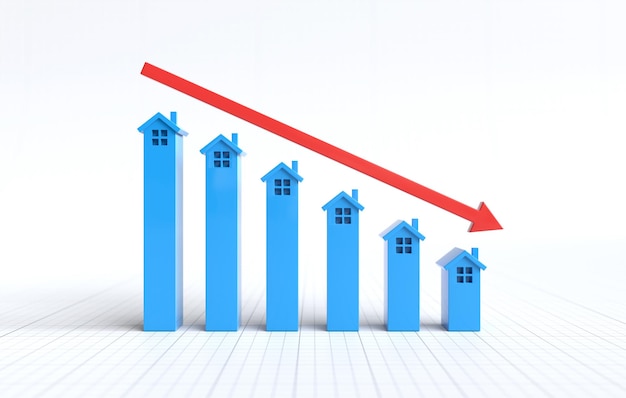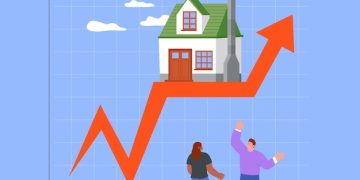Federal Reserve Rate Hike: What It Means for US Mortgage Rates

Anúncios
A Federal Reserve interest rate hike, such as the anticipated 0.5% increase, directly influences mortgage rates in the US; higher rates typically lead to more expensive home loans, potentially cooling the housing market and impacting affordability for prospective buyers.
The looming question on every prospective US homebuyer’s mind is: **What Does the Federal Reserve’s Anticipated 0.5% Interest Rate Hike Mean for Mortgage Rates?** This increase, while seemingly small, can have significant ripple effects across the housing market.
Anúncios
Understanding the Federal Reserve’s Role
The Federal Reserve, often called the Fed, plays a crucial role in the US economy. Its primary function is to maintain economic stability, which it achieves through various measures, including adjusting the federal funds rate.
What is the Federal Funds Rate?
The federal funds rate is the target rate that the Federal Reserve wants banks to charge one another for the overnight lending of reserves. This rate influences other interest rates throughout the economy, including those for mortgages.
Anúncios
How the Fed Influences Mortgage Rates
Though the Fed doesn’t directly set mortgage rates, its actions significantly influence them. When the Fed raises the federal funds rate, it becomes more expensive for banks to borrow money. These increased costs are often passed on to consumers in the form of higher interest rates for loans, including mortgages.
- The federal funds rate impacts short-term lending rates, which in turn influence longer-term rates like mortgages.
- Mortgage rates are also influenced by investor expectations and the overall economic outlook.
- When the Fed signals a more hawkish stance (i.e., indicating more rate hikes), mortgage rates tend to rise.
In conclusion, understanding the role of the Federal Reserve and the federal funds rate is essential to grasp how mortgage rates are affected. The Fed’s policies can have a substantial impact on the affordability of homeownership in the US.

The Direct Impact on Mortgage Rates
The most immediate effect of a Federal Reserve interest rate hike is its impact on mortgage rates. A 0.5% increase, while not drastic, can still make a noticeable difference in the overall cost of a home loan.
Immediate Rate Adjustments
Following a Fed rate hike, lenders typically adjust their mortgage rates to reflect the new interest rate environment. This means that prospective homebuyers will likely face higher rates when applying for a mortgage.
Increased Borrowing Costs
Higher mortgage rates translate directly to increased borrowing costs. This includes both the monthly mortgage payments and the total interest paid over the life of the loan.
For a more detailed look, consider these aspects:
- A 0.5% rate hike can increase monthly mortgage payments by tens to hundreds of dollars, depending on the loan amount.
- Over the life of a 30-year mortgage, a 0.5% increase can add tens of thousands of dollars to the total interest paid.
- This increase can significantly affect the affordability of homes for many potential buyers.
Ultimately, a Federal Reserve interest rate hike directly impacts mortgage rates by increasing borrowing costs for prospective homebuyers, making it more expensive to finance a home purchase.
How It Affects Different Types of Mortgages
Different types of mortgages react differently to a Federal Reserve interest rate hike. Understanding these variations can help homebuyers make informed decisions.
Fixed-Rate Mortgages
Fixed-rate mortgages offer stability because the interest rate remains constant throughout the loan term. However, these mortgages are still affected by Fed rate hikes.
Adjustable-Rate Mortgages (ARMs)
Adjustable-rate mortgages (ARMs) have interest rates that can change over time, often in relation to a benchmark interest rate. They are more directly and quickly influenced by Fed rate hikes.
To better understand the impact, consider these mortgage types:
- Fixed-Rate Mortgages: While existing fixed-rate mortgages are unaffected, new ones will be issued at higher rates.
- Adjustable-Rate Mortgages (ARMs): These will see immediate rate increases, potentially raising monthly payments.
- Hybrid ARMs: These offer a fixed rate for an initial period before converting to an adjustable rate, delaying but not eliminating the impact.

The Broader Economic Implications
A Federal Reserve interest rate hike doesn’t just affect mortgage rates; it has broader implications for the US economy as a whole. These implications can indirectly affect the housing market and the overall financial landscape.
Cooling the Housing Market
One of the primary goals of raising interest rates is to cool down an overheating economy, which can include the housing market. Higher mortgage rates can reduce demand for homes, leading to slower price growth or even price declines.
Impact on Consumer Spending
Higher interest rates can also dampen consumer spending. When borrowing becomes more expensive, consumers tend to reduce their spending, which can slow economic growth.
Here are some related points to consider.
- Slower housing market growth can reduce wealth accumulation for homeowners.
- Reduced consumer spending can lead to slower economic growth and potentially higher unemployment.
- Businesses may reduce investment due to higher borrowing costs, further slowing economic activity.
In general, the Fed’s decision to hike interest rates is a balancing act between controlling inflation and maintaining economic growth. The effects ripple through various sectors, influencing consumer behavior and business investment.
Strategies for Homebuyers in a Rising Rate Environment
Navigating the housing market in a rising interest rate environment requires careful planning and strategic decision-making. Homebuyers can take steps to mitigate the impact of higher mortgage rates.
Improving Credit Score
A higher credit score can help secure a lower mortgage rate, even in a rising rate environment. Review your credit report for errors and take steps to improve your score before applying for a mortgage.
Shopping Around for the Best Rates
Don’t settle for the first mortgage rate you’re offered. Shop around with multiple lenders to find the most competitive rates.
Considering an Adjustable-Rate Mortgage (ARM)
While ARMs come with risks, they may offer lower initial rates compared to fixed-rate mortgages. Just be sure to understand the terms and potential for rate increases.
- Aim for a credit score of 760 or higher to qualify for the best mortgage rates.
- Compare offers from at least three to four different lenders.
- If considering an ARM, understand the cap on how much the rate can increase each year and over the life of the loan.
To sum it up, being proactive and informed will greatly improve your chances of securing an affordable mortgage in a rising rate environment. A more conservative approach with a fixed-rate mortgage may be your best approach to consider.
Expert Opinions and Forecasts
To gain a comprehensive understanding of the impact of a Federal Reserve interest rate hike, it’s helpful to consider the opinions and forecasts of financial experts.
Insights from Economists
Economists offer valuable perspectives on the potential effects of Fed policy changes. Their insights can help homebuyers and investors anticipate market trends.
Predictions for Future Rate Hikes
Many experts provide predictions about future Fed rate hikes, which can inform decisions about when to buy or refinance a home.
Here are points to consider when following expert opinions:
- Economists’ forecasts are based on models and assumptions, so they are not always accurate.
- Predictions about future rate hikes can vary widely, depending on the expert and their economic outlook.
- It’s important to consider a range of opinions and make your own informed decisions based on your individual circumstances.
Consulting financial experts and following economic forecasts can help individuals make more informed decisions in light of Federal Reserve policy changes and their impact on mortgage rates.
| Key Point | Brief Description |
|---|---|
| ⬆️ Rate Hike Impact | Increased mortgage rates and borrowing costs for new homebuyers. |
| 🏠 Housing Market | Cooling effect, potentially slowing price growth or causing declines. |
| 💰 Consumer Spending | Higher rates can reduce consumer spending and slow overall economic growth. |
| 💡 Homebuyer Strategies | Improve credit, shop for rates, consider ARMs cautiously. |
Frequently Asked Questions (FAQ)
▼
The Federal Reserve doesn’t directly set mortgage rates, but its policies, like adjusting the federal funds rate, affect the broader interest rate environment, influencing mortgage rates set by lenders.
▼
A 0.5% rate hike can increase your monthly mortgage payment. The exact amount varys on the loan’s size. You may need to ask your bank about your specific situation.
▼
It mostly depends on the risk to tolerance. Fixed-rate mortgages offer stability, while adjustable-rate mortgages (ARMs) may have lower initial rates only.
▼
Consider refinancing. If you want to switch your adjustable-rate mortgage to fixed-rate, refinancing might be a good choice and it creates new, more manageable financial situations.
▼
Economic growth, inflation, and investor sentiment all affect mortgage rates, along with broader global economic trends.
Conclusion
In summary, a Federal Reserve interest rate hike has multifaceted effects on mortgage rates and the broader US economy. Understanding these implications is crucial for homebuyers, homeowners, and investors alike to navigate the financial landscape strategically.





